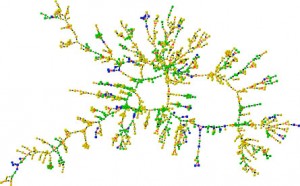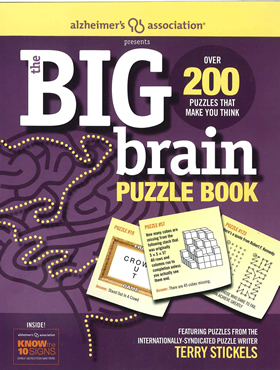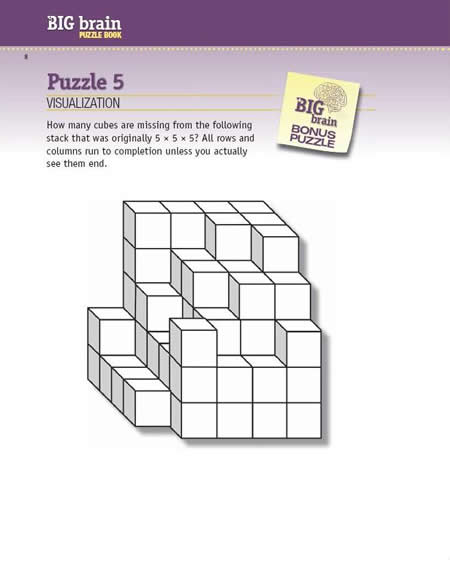Published: December 2, 2009
 Loneliness, like a bad cold, can spread among groups of people. The new study, led by John Cacioppo of the University of Chicago, found that loneliness is catching, possibly because lonely people don’t trust their connections and foster that mistrust in others.
Loneliness, like a bad cold, can spread among groups of people. The new study, led by John Cacioppo of the University of Chicago, found that loneliness is catching, possibly because lonely people don’t trust their connections and foster that mistrust in others.
Using longitudinal data from a large-scale study that has been following health conditions for more than 60 years, a team of scholars found that lonely people tend to share their loneliness with others. Gradually over time, a group of lonely, disconnected people moves to the fringes of social networks. [continue reading…]
Published: November 5, 2009
 Technology is no longer what it used to be: Computers have replaced typewriters and landlines are in rapid decline. Technological advances are being made every day, making many of our lives easier and allowing information to be more accessible and available. However for some people, such as the aging population, technological progress can in fact be more limiting.
Technology is no longer what it used to be: Computers have replaced typewriters and landlines are in rapid decline. Technological advances are being made every day, making many of our lives easier and allowing information to be more accessible and available. However for some people, such as the aging population, technological progress can in fact be more limiting.
Psychologists Neil Charness and Walter R. Boot from Florida State University have outlined these limitations and suggested improvements in a recent paper published in Current Directions in Psychological Science, a journal of the Association for Psychological Science. They claim the key to including the aging population in information technology is to adopt design principles that are age sensitive. [continue reading…]
Published: October 23, 2009
 While more older adults than ever are using cell phones and computers, a technology gap still exists that threatens to turn senior citizens into second-class citizens, according to Florida State University researchers.
While more older adults than ever are using cell phones and computers, a technology gap still exists that threatens to turn senior citizens into second-class citizens, according to Florida State University researchers.
“The technology gap is a problem because technology, particularly computer and Internet technology, is becoming ubiquitous, and full participation in society becomes more difficult for those without such access,” said Charness, who along with Boot received a $1.5 million, five-year subcontract from a National Institute of Aging grant to support the Center for Research and Education on Aging and Technology Enhancement (CREATE). Established a decade ago, the center is comprised of researchers at FSU, the University of Miami and the Georgia Institute of Technology, who study ways to increase technology use in order to promote cognition and health in older Americans. [continue reading…]
Published: October 16, 2009
 Alzheimer’s disease is a most terrifying disease; it strips those who have it of their dignity and independence. Even though I haven’t worked with the elderly for over 20 years, my opinion of this horrible disease has not changed in the slightest. What has changed? Well …. I am ageing, and before me the prospect looms (much closer now) of my own risk for dementia, and along with this an increasing desire to do whatever I can to side-step this disease.
Alzheimer’s disease is a most terrifying disease; it strips those who have it of their dignity and independence. Even though I haven’t worked with the elderly for over 20 years, my opinion of this horrible disease has not changed in the slightest. What has changed? Well …. I am ageing, and before me the prospect looms (much closer now) of my own risk for dementia, and along with this an increasing desire to do whatever I can to side-step this disease.
Many people seem to share my fear, and perhaps this is one of the reasons why there has been a boom in the sale of brain training products worldwide? Millions of people regularly play brain training games, in the belief that they will improve their cognitive skills. The theory behind Brain Training seems to make sense: regularly exercising the brain with tests and puzzles can improve brain skills and help people become better at everyday thinking tasks.
Given the above, I was delighted to receive a copy of The Big Brain Puzzle Book  for review. The book, which has been endorsed by the Alzheimer’s Association, features over 200 puzzles from the internationally-syndicated puzzle writer Terry Stickles. I have found this book to be challenging and enjoyable; and when I fail a puzzle, I even find it irritating 😉  The fact that it is presented in an easily readable large type and a pleasing layout is an added bonus 🙂 ……….Dr. O
Here are some of examples of the puzzles:


Puzzles: ©Terry Stickles 2009 (reproduced with permission) Originally published in ALZHEIMER’S ASSOCIATION PRESENTS THE BIG BRAIN PUZZLE BOOK”
 Loneliness, like a bad cold, can spread among groups of people. The new study, led by John Cacioppo of the University of Chicago, found that loneliness is catching, possibly because lonely people don’t trust their connections and foster that mistrust in others.
Loneliness, like a bad cold, can spread among groups of people. The new study, led by John Cacioppo of the University of Chicago, found that loneliness is catching, possibly because lonely people don’t trust their connections and foster that mistrust in others.




